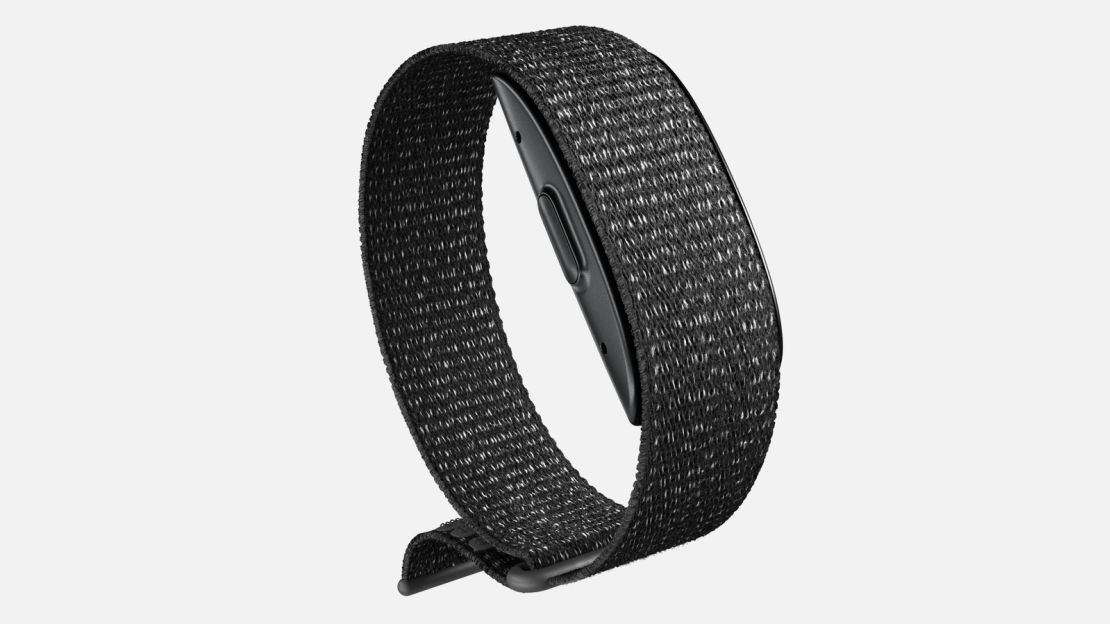Amazon has tried to make its services and products an indispensable part of people’s day, from putting its Alexa voice assistant everywhere to selling virtually everything on Amazon.com. In the process, it’s collected mountains of data.
Now, it wants to creep into even more sensitive areas of its customers’ lives.
On Thursday, the tech giant launched Halo, its first health wearable, along with an accompanying app, in the United States. The device, which is worn on the wrist, offers similar features to other wearables on the market, such as activity and sleep tracking, but it also comes with several new offerings that are sure to stoke privacy concerns.
The “Tone” feature, which people must opt-in to, uses small mics on the band and machine learning to analyze your voice to predict how other people might perceive your tone. The technology takes into account pitch, intensity, tempo and rhythm, to create timestamps of your speech with labels such as “content” or “hesitant” as well as positivity and energy levels. Amazon said users never hear their voice snippets; they just see the results of the analysis on the app.

The idea of a device picking up snippets of your voice and judging it may feel like a dystopian scene from Black Mirror, especially at a time when Americans are concerned and confused about the handling of their personal data.
In a virtual presentation ahead of the launch, Amazon executives emphasized the privacy controls behind the feature, including that speech samples are processed only on your phone — never in the cloud — and will be deleted automatically after processing. Amazon said no human will ever hear the voice samples — something it has come under fire for with its Alexa-powered devices — and users can delete Tone results or their entire voice profile from the app.
“All of these devices have risks, and are always going to have risks,” said Pam Dixon, executive director of the nonprofit research group World Privacy Forum, who helped advise Amazon on Halo, but was not paid by the company to do so, though the organization received funding from Amazon in the past. “All of the tech companies right now, their biggest fight is for the trust of people. … Ensuring that no one sees or hears this data ever is really important.”
Dr. Maulik Majmudar, a cardiologist and principal medical officer for Amazon Halo, billed the Tone feature as a way to better your communication and relationships, such as making sure you’re not taking work stress out on your family when working from home. “We recognize the sensitivity, so we put in a lot of privacy controls to earn and maintain customer trust around this feature,” he told CNN Business.
Last year, consumers were disturbed to find out that if they talk to a virtual assistant, such as Alexa or Apple’s Siri, a human may listen to a recording of their chatter. (The companies said this was done to improve the devices.) At the time, Apple temporarily halted human review of recordings, and Amazon changed its settings to make it easier for people to avoid such review at all.
Amazon’s Halo Band also features a way to measure body fat index through the accompanying app and a smartphone camera — another incredibly sensitive and personal data point. After posing for the camera, artificial intelligence generates a 3D model of your body.
A “body model slider” lets you visualize how you’d look if you lost or put on body fat, in an effort to motivate users. That feature doesn’t use your exact body, but is based on the height, age, and sex you enter into the app.
Amazon said body scan images are “automatically” deleted from the cloud after processing. Images and the personalized 3D body model are then stored only on your phone. Body data can be deleted via the settings tab in the app.
Users can also link their Weight Watchers or John Hancock Vitality wellness program accounts. The app also offers challenges and workouts from third parties, including Headspace, Orangetheory Fitness and the Mayo Clinic. Amazon said it will only provide third parties with anonymized data.
Halo users will also have a separate log in for the service, and it won’t be linked to their Amazon.com or Prime account.
The Amazon Halo Band costs $99.99 and comes with six months of free membership to the app, which otherwise costs $3.99 per month. US customers can request early access to the band and app starting Thursday for a lower price. The device comes in black, gray and rose gold. Unlike other popular wearables, the Halo Band features no screen and offers seven days of battery life.

























